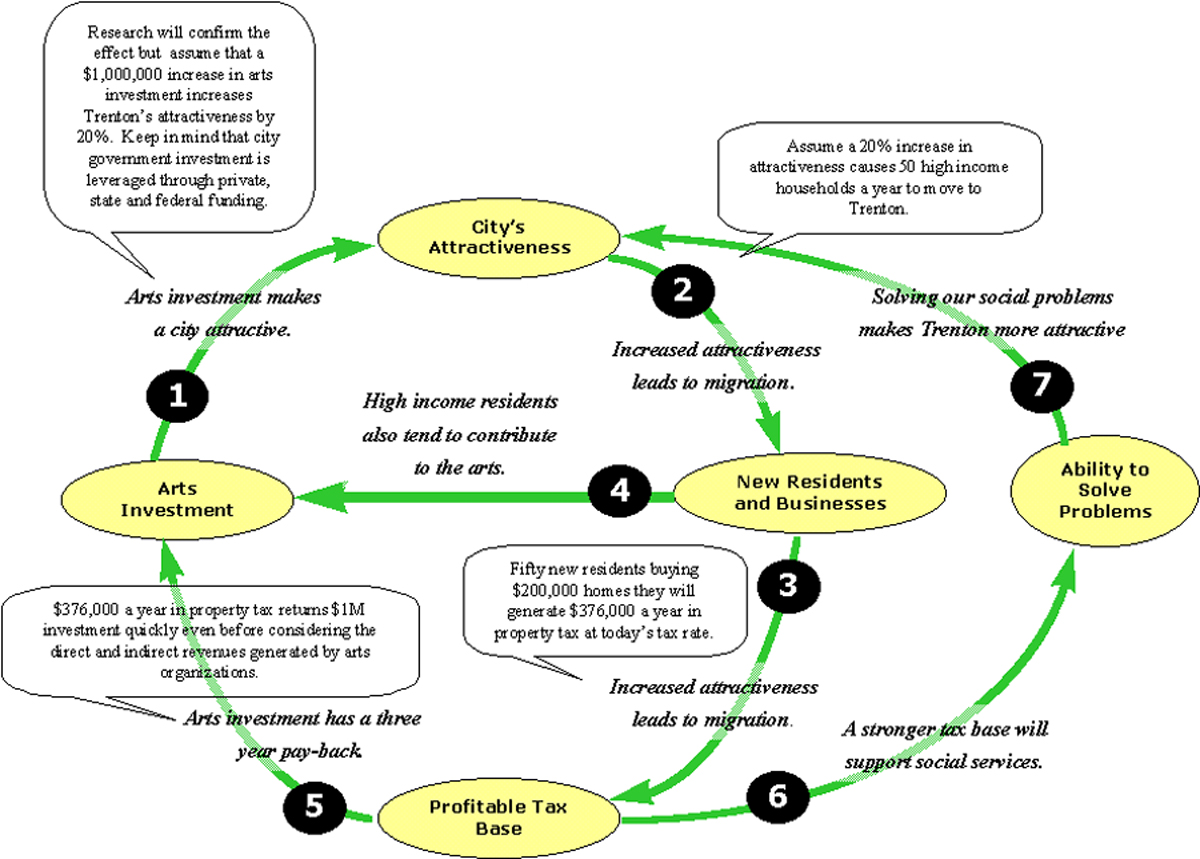 |
The Case for Arts Investment
By Dan Dodson
I don’t want this article to sound like an enthusiast telling you to support the arts because it’s good for you. While I was raised to appreciate the arts at the expense of other entertainment, I’m under no illusion that Beethoven will supplant Eminem anytime soon. To be honest, most of my arts volunteer work has been a thinly veiled ploy to meet women. With due respect to Trenton’s wonderful arts community, I’m not making the case for arts investment to raise the quality of the soul but rather to raise the value of Trenton’s property
In my September 2002 Downtowner article "The Case Against Affordable Housing", I made the argument that Trenton needs to raise its median income by attracting more high income residents. Fundamental to this argument is making Trenton attractive to new residents with disposable income. I support this objective as the key to building a sustainable city that can provide both enlightenment and charity for its citizens.
However attracting wealthy big spenders to Trenton isn’t so easy. If it were, we’d be crawling with them.
We have some things working against us including a lack of upscale housing, high crime and schools with a perception problem. We have an incredibly high property tax rate (3.76%) and we struggle to pay for our welfare programs. According to Economic Development Incentives, Suburban Growth and Urban Redevelopment in New Jersey by Alan Mallach, Trenton, like other urban cities, is filled with land that has negative property value. With all this going against us, we find it difficult to attract high value residential investment to offset the tax burden and make it possible to properly support our citizens.
Can investing more heavily in the arts be the key to starting a renaissance in Trenton?
The city’s investment in the arts is the best way to stimulate Trenton’s revitalization. Arts spending has a multiplier effect on the economy and the resulting arts culture has a positive effect on the decision to move to Trenton. With an increased tax roll, we can afford our social programs.
Investing in the arts isn’t expensive.
The arts has a powerful economic multiplier effect. According to American for the Arts’ Arts & Economic Prosperity: The Economic Impact of Nonprofit Arts Organization Audiences, $100,000 of spending by a non-profit arts organization generates 3.36 jobs and $2,841 in tax revenue for a city the size of Trenton. Additionally, event-related expenditures for meals, souvenirs etc. average $22.10 per person. According to the Trenton Arts Connection, Trenton’s annual arts attendance was 421,000 people a year in 2000 which would yield $9.3M in indirect revenues.
According to the Pennsylvania Economy League’s Greater Philadelphia’s Competitive Edge: The Nonprofit Culture Industry and its Economic Value to the Region, $1 spent on arts in Philadelphia generates $2 in organizational spending. According to Arts as Economic Development: Beyond the Hype by Bridget Wiedman, spending in Trenton may not benefit quite as much, but the effect on Mercer County could be similar.
If our city government can carefully invest in responsible arts organizations it will help attract state, federal and private funding. Arts funders often see city investment as a "seal of approval" for arts organizations. They know that city officials are close to the organization and won’t invest their limited funds if the group isn’t viable. For every $1 the city invests, arts organizations will receive $9 in from other sources.
Increasing the city’s attractiveness impacts the tax roll.
The big payoff in arts investment comes from increasing the city’s attractiveness to residents with disposable income. People like to live near where they play. Art museums provide pleasant afternoon diversions. Symphonies, theater and opera are the bulwark of "date night" which includes an expensive dinner and après event drinks. Outdoor sculpture directly improves nearby real estate value and outdoor festivals create a sense of community and fun.
In a survey entitled "Why people move to and away from New York City", 56% cited cultural attractions as a reason to move to the city.
The recently announced Performa Entertainment project in South Trenton is proof of the theory. Performa is basing its development plans on creating a jazz themed entertainment district adjacent to new market rate housing. Pardon the cynicism, but I doubt Performa is investing in the arts just for fun.
The following diagram shows how arts investment is a catalyst for increasing the city’s ability to solve its social problems. Notice that arts investment creates a virtuous circle of beneficial effects.

Therefore, the arts must be a high investment priority for the city
City investment in the arts is highly leveraged by federal, state and private funding. Additionally, spending for arts events is matched by indirect spending on items such as food. However, a city government will not recoup its investment from direct and indirect tax receipts. The real benefit from arts investment is the increase in the city’s attractiveness to home and business investment.
Though it requires further study, increasing attractiveness through the arts can easily produce a three year pay-back. Given that the spending impact from the arts halves the city’s exposure, the actual pay-back will be 1.5 years or 70% ROI. This is a return that can be reinvested not only in the arts, but public safety and social programs. These are pretty good results for government work.
I’m not letting it lie.
Apparently our city council doesn’t share Performa’s investment philosophy. Last May, The Trenton Arts Roundtable sent all 27 city council candidates a survey on arts issues. Seven candidates returned the survey, the results of which were published in May’s Downtowner (see the results at www.trentondowntowner.com). Only one of our current council members was among the seven. We’ll need a different attitude in city hall for the arts to kick-start Trenton’s renaissance.
###
Dan Dodson is a management consultant and Leadership Trenton Fellow.
Copyright 2002, Dan Dodson